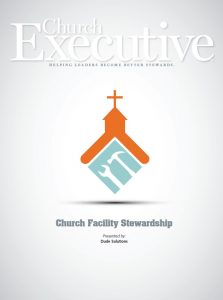
By Donovan Loomis
The value your facility manager holds for your church goes far beyond the work he or she does to keep the facilities running.
In fact, when it comes to your church’s long-term financial sustainability, this individual might even have more valuable information in his or her head than anyone else.
If there’s only one thing you take away here, let it be this: You unequivocally cannot afford to lose your facility manager’s intellectual knowledge.
Every week, I hear stories from churches looking for help because their long-time facility manager retired or moved on. One of the first questions I ask is if they kept a record of what he or she was doing. Usually, the answer is affirmative — but either the information doesn’t make sense to the people looking at it, or it takes hours to find what they’re looking for.
However, if the church had talked to the facility manager before he or she left, the facility manager probably would have been proud of the tracking system!

Without a doubt, I’m sure all these systems are well-intentioned, well-thought-out methods that make perfect sense to the person who invented them. Unfortunately, they mean nothing to the person on the outside looking in.
It’s like that birthday card you receive, and you can only decipher every fourth word at best (sorry, Mom). But, to the person who wrote it, it looks perfectly legible. Finding a system or method that makes sense to someone else with no explanation is no easy task, but one that should be taken seriously.
Why is documentation so important?
Your facility manager not only knows every quirk and every detail about your facility, but they know when things were replaced, what work has been done to maintain assets, what kind of preventive maintenance is required, filter sizes needed, when and what safety inspections need to be done, any documentation required, and what to look for in the Monday morning walk-through.
How do you make it easier for the next person?
As mentioned, this information has to be in a format that makes sense to someone walking in fresh. This starts with establishing all information that needs to be captured for the next person.
As an example, here is some basic equipment information that should be captured in a comprehensive list:
- Maintenance history record
- Preventive maintenance schedules and checklists
- Filter sizes and other relevant information
- Equipment manuals
- Installation date
- Purchase cost
- Warranty information
- Life expectancy
- Replacement cost
- Vendor information
All of this information should be in one centralized database where it can be easily accessed in a clear and comprehensible format. As a bonus, if you put a formalized system in place, you’ll also be able to find ways to use your resources (financial or staff) more efficiently.
This information will not only help the church continue to make good decisions, but it will also be easier to attract new team members when they’re walking into an environment that makes it easier for them to do their job well. The ‘This-is-the-way-we’ve-always-done-it’ mindset isn’t effective for sustainability and growth. It’s also not effective for attracting new employees.
If the idea of creating your own database seems too daunting, there are computerized maintenance management software (CMMS) programs out there that will help automate that process for you. Give them a look, and decide what the best solution is for your church’s needs.
You wouldn’t forgo insurance on an important asset you’ll inevitably lose one day. So, why would you risk losing this type of valuable information?
Donovan Loomis has more than four years of experience in church facility management and serves as Dude Solutions’ Industry Specialist, focusing solely on places of worship. He graduated from East Carolina University in 2012 with a B.S. degree.


